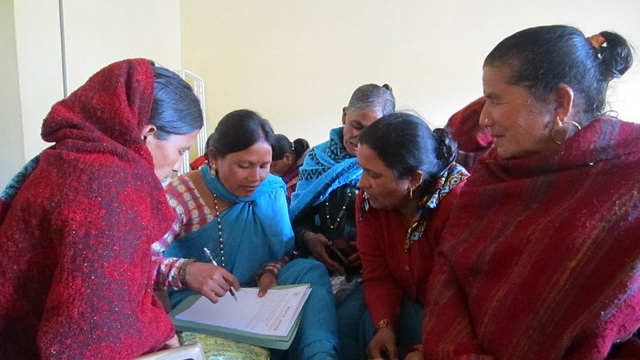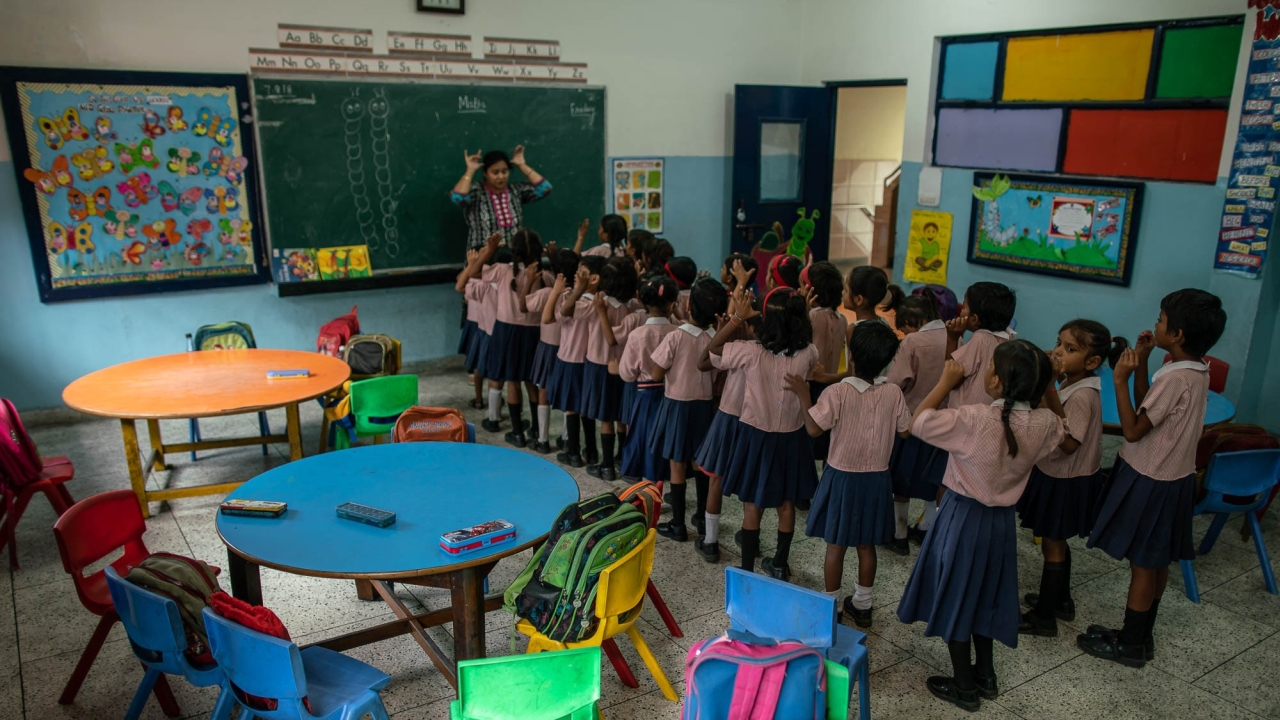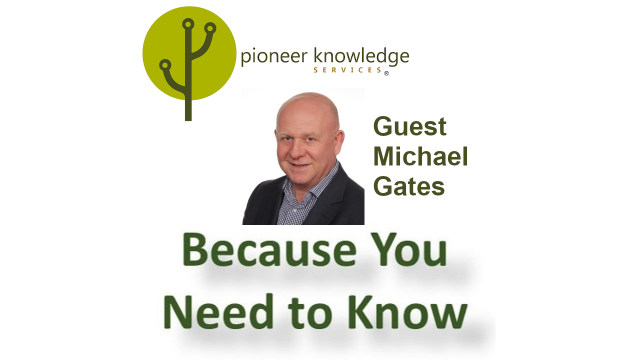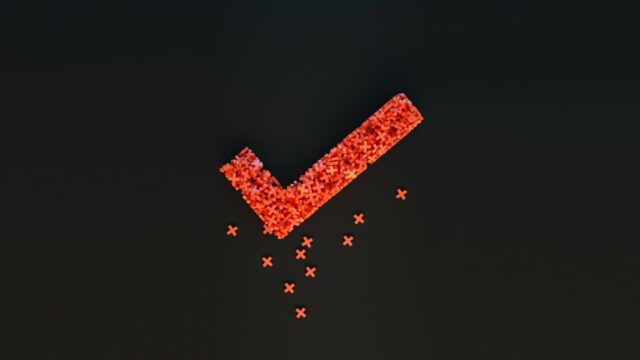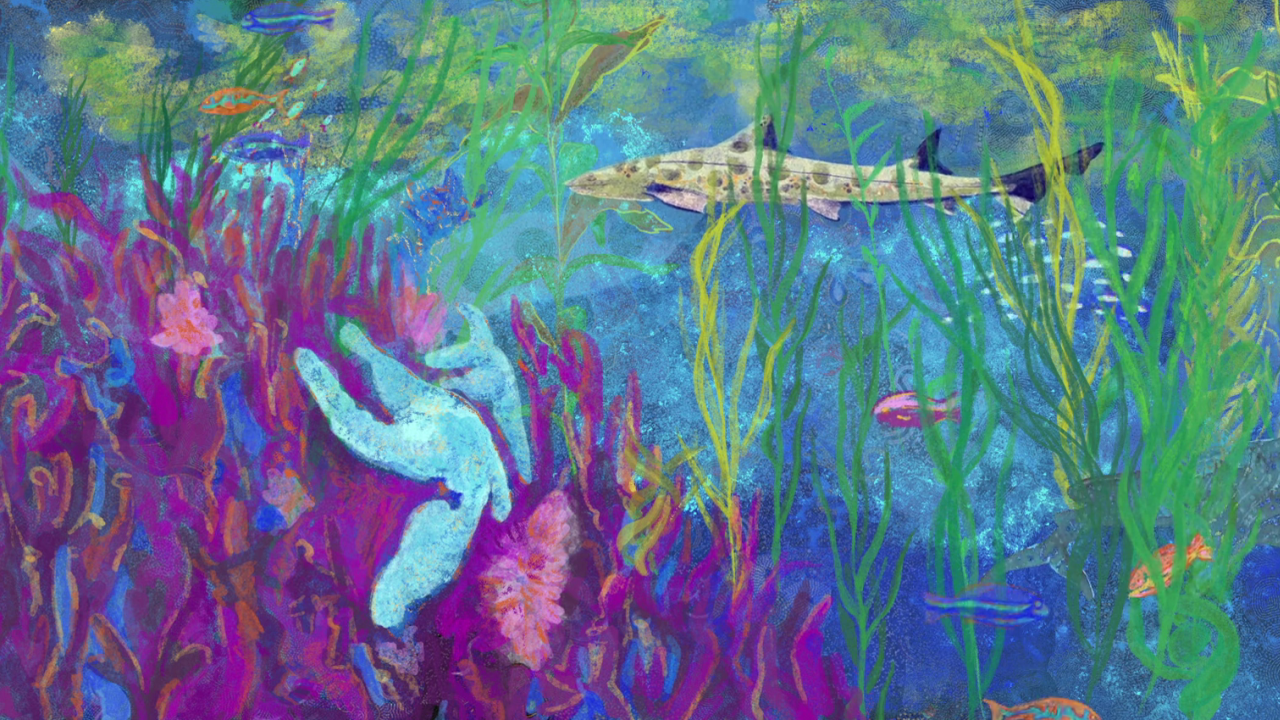
Introducing a unique, inspirational web platform connecting knowledges on the ocean – meet One Ocean Learn!
By Sarah Cummings PhD, Elisa Morgera PhD, Josefina Ashipala, and Angus Mackay.
I’ve been using the learning resources to be able to empower my community and strengthen my knowledge on ocean-related events, I’m an advocate and ocean defender working with other organizations, so this would help me. (Platform user, March 2024)
The One Ocean Learn platform is unique in many ways – and this needs celebrating. It immerses users in a sea of resources where they can experience beauty and awe. It nourishes learning through curiosity and wonder. It inspires and challenges learners by navigating across scientific resources, different disciplines, arts, and opportunities for partnerships (Figure 1).
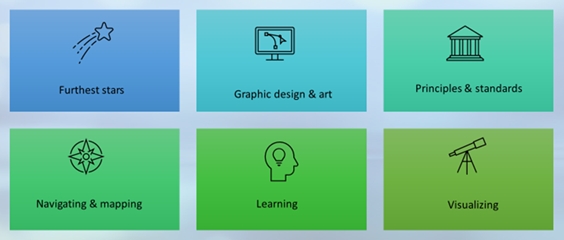
One Ocean Learn is looking for partners who share its commitment to knowledge and advocacy on ocean governance for the next phase of its development. But first a brief introduction…
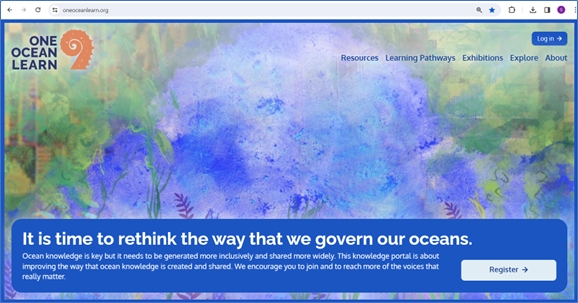
Reaching the furthest stars…
I really like all the thematic areas on the Learning Pathway platform and I would say that being a student from a Small Island Developing States, I really appreciate the free courses (Learning Pathways) which most of us could not afford. (Platform user, March 2024)
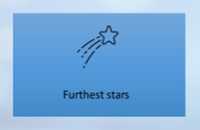 One Ocean Learn (Figure 2) is an online platform which aims to support global capacity building by translating ocean knowledge into action-oriented learning for activists, communities, development practitioners, policymakers and researchers. Capacity building relates to the ways in which global, national and local communities depend on and relate to the ocean, coastal areas and marine life. The focus is on connecting knowledge from different sources and enhancing capacities to use integrated knowledge to address real-word questions and understand experiences, with a view to contributing towards more sustainable decisions on the ocean. The rationale for this new platform is that the new knowledge about the oceans is being generated across multiple global, regional national and local initiatives, but it needs to reach more people and be more clearly connected to be more likely to lead to positive action. In particular, the platform aims to shine light on the ‘furthest stars’, namely local and national initiatives on the ocean which are often obscured by the overload of information available online.
One Ocean Learn (Figure 2) is an online platform which aims to support global capacity building by translating ocean knowledge into action-oriented learning for activists, communities, development practitioners, policymakers and researchers. Capacity building relates to the ways in which global, national and local communities depend on and relate to the ocean, coastal areas and marine life. The focus is on connecting knowledge from different sources and enhancing capacities to use integrated knowledge to address real-word questions and understand experiences, with a view to contributing towards more sustainable decisions on the ocean. The rationale for this new platform is that the new knowledge about the oceans is being generated across multiple global, regional national and local initiatives, but it needs to reach more people and be more clearly connected to be more likely to lead to positive action. In particular, the platform aims to shine light on the ‘furthest stars’, namely local and national initiatives on the ocean which are often obscured by the overload of information available online.
Launched in June 2022 at the Ocean Summit, One Ocean Learn is a joint undertaking between the One Ocean Hub, a collaborative research programme for sustainable development funded by UK Research and Innovation through the Global Challenges Research Fund (Grant Ref: NE/S008950/1), and the United Nations Institute for Training and Research (UNITAR). The One Ocean Hub seeks to transform ocean governance by changing the way ocean knowledge is generated and shared. Ocean systems are highly interconnected, as are the multiple threats that the ocean faces. Yet responses to these challenges have historically been provided in siloes, characterised by disconnects across scales and sectors, and by artificial distinctions between ‘land’ and ‘ocean’ issues. These disconnects are mirrored in the process of evidence generation, which is constrained by disciplinary boundaries and – crucially – has long left out the voices, experiences and knowledge of those who have the closest connections to the ocean. To fulfil the vision of a healthy ocean where people and the planet can flourish, the One Ocean Hub focuses on transforming decision-making by co-developing evidence through dialogue among different knowledge systems. To bridge the “know-do gap” (the gap between what we know and what we do in practice), One Ocean Learn has then be devised to facilitate: knowledge brokering; interactive communication between evidence users and producers; demand-driven knowledge packaging; capacity building in knowledge management and sharing; and continuous evaluation, refinement and systematic documentation of the effects of knowledge sharing.
The first phase of the platform runs from 2022-2024. It builds upon the One Ocean Hub’s inter- and transdisciplinary research in Ghana, Namibia and South Africa, as well as at the international and regional levels in the South Pacific and the Caribbean. This research focuses on the integration of human rights, marine and social sciences, and the arts, to support fair and inclusive decision-making for a healthy ocean whereby people and planet flourish. The platform has been inspired by Dylan McGarry’s beautiful designs for the One Ocean Hub website and by the One UN Climate Change Learning Partnership, known as UN CC:Learn. UN CC:Learn, managed by UNITAR, is a joint initiative of more than 30 multilateral organizations helping countries to achieve climate change action both through general climate literacy and applied skills development. It is a hugely successful undertaking, reaching 857,457 users and issuing them with 389,485 certificates (March 2024).
Although the vision for the portal comes largely from the teams of UNITAR and the One Ocean Hub, augmenting this vision and putting it into practice has relied heavily on the expertise and flair provided by WeAreBoq, a web design and development studio based in Lisbon, Portugal.
Curiosity and wonder in the graphic design and art exhibitions
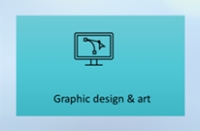 Knowledge, learning and change are nourished by curiosity and wonder. For this reason, the platform has made innovative use of graphic design. For the same reason, it also features art exhibitions to grow understanding, creativity and respect for diverse experiences and opinions so that our minds and senses are taken on a journey that demonstrates a more inclusive and collective approach to ocean knowledge and ocean governance.
Knowledge, learning and change are nourished by curiosity and wonder. For this reason, the platform has made innovative use of graphic design. For the same reason, it also features art exhibitions to grow understanding, creativity and respect for diverse experiences and opinions so that our minds and senses are taken on a journey that demonstrates a more inclusive and collective approach to ocean knowledge and ocean governance.
Graphic design
The graphic design has been commissioned from the Mexican artist, Julia Granillo Tostada, to narrate stories and myths around the ocean from different parts of the world. Depending on where users are 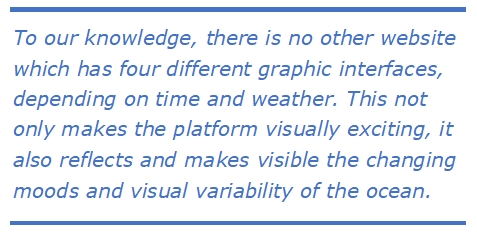 located in time and space – day/night or good weather/bad weather – they will see four potential sets of background images. If you visit the platform at another time of day, when the wind is blowing and seas are rough, you will see a different background, featuring other images. On a sunny day with calm weather, you will see Hawaii’s lantern ceremony (Figure 3) but if you go back later when the wind is blowing and it’s dark outside, you will see Hawaiki Island with a ghostly ship (Figure 4). To our knowledge, there is no other website which has four different graphic interfaces, depending on time and weather. This not only makes the platform visually exciting, it also reflects and makes visible the changing moods and visual variability of the ocean.
located in time and space – day/night or good weather/bad weather – they will see four potential sets of background images. If you visit the platform at another time of day, when the wind is blowing and seas are rough, you will see a different background, featuring other images. On a sunny day with calm weather, you will see Hawaii’s lantern ceremony (Figure 3) but if you go back later when the wind is blowing and it’s dark outside, you will see Hawaiki Island with a ghostly ship (Figure 4). To our knowledge, there is no other website which has four different graphic interfaces, depending on time and weather. This not only makes the platform visually exciting, it also reflects and makes visible the changing moods and visual variability of the ocean.
The images have been inspired by various locations and cultures related to the oceans, integrating different graphic elements and traditional stories. The images are divided into four themes. Each theme has been designed to narrate a small story or situation through four iterations of the main illustration in different contexts: day time, night time, good weather and bad weather. The illustrations are inspired by the locations and cultures on which this platform is focused. For the platform, the artist has animated these images in a way which ensures that the platform remains low-bandwidth friendly.


Art exhibitions
Building further on the curiosity and wonder released by images and design, the platform also features regular art exhibitions. The first, Traditions and tales from the sea (June 2022), features the beautiful images developed by Julia Granillo Tostada for the website. The second, Marine portraits (December 2022), are paintings created by Professor Elisa Morgera, the Director of the One Ocean Hub. They were conceived and made during the first lockdown in the UK (2020) and loosely inspired by Dylan McGarry’s artwork for the One Ocean Hub’s website. They are both a way to celebrate the uniqueness and allure of marine life, and to feel personally connected to marine biodiversity as the centre of gravity of Elisa’s lifework as a scholar. Fishers’ tales (27 March 2023) represents an arts-based storytelling project that connects fishers’ stories of meaning, family, declining yields, oppression and marginalization with photographs and other visual art from South Africa. In a new exhibition, The WiseSands (18 April 2024), Mireia Bes Garcia has created ceramic sea turtles from discarded clay, representing the wisdom and long journeys of sea turtles in the context of climate change.

The innovation here, which also lies at the core of the Hub’s innovative art-based research approaches, is utilising creative responses and cultural heritage (SDG 11.4) not for dissemination but as an active means of involving different knowledge holders, surfacing multiple, competing conceptions of the ocean that are generally under-represented in more traditional approaches to ocean research and governance. This incorporates insights from Indigenous and local knowledge, distinctive livelihoods and views, including of women, children and youth. In turn, this engagement with ocean art and cultural heritage nurtures an understanding of often invisible or silenced ocean-based practices and economies. It also highlights disregard for social and environmental justice and tensions between mainstream economic approaches and socio-cultural approaches that are grounded in sense of place and lived realities.
Despite the integration of high-quality visual content, the platform remains low-bandwidth, accessible to users on a mobile phone. In this way, it is making efforts to comply with guidance for web portals and platforms which are designed to support knowledge sharing in international development.
Key principles and adherence to international guidelines
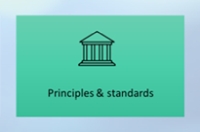 As explained above, the platform aims to shine its light on the furthest stars, not by copying their content but rather by linking to them. We see the furthest stars as web resources that will not be usually found by a Google search, such as the smaller community-based organizations in the global South and particularly the endeavours of the One Ocean Hub in Ghana, Namibia and South Africa, as well as South Pacific and the Caribbean. Although this is sometimes limited by the team’s capacity, this is the basic principle on which the portal is founded.
As explained above, the platform aims to shine its light on the furthest stars, not by copying their content but rather by linking to them. We see the furthest stars as web resources that will not be usually found by a Google search, such as the smaller community-based organizations in the global South and particularly the endeavours of the One Ocean Hub in Ghana, Namibia and South Africa, as well as South Pacific and the Caribbean. Although this is sometimes limited by the team’s capacity, this is the basic principle on which the portal is founded.
By taking the approach of shining light on the furthest stars, One Ocean Learn has strived to be 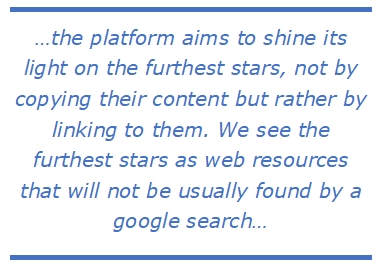 consistent with two international guidelines produced by the international Knowledge Management for Development (KM4Dev) community and its partners. During its development, the platform aimed to comply with KM4Dev’s Checklist for the development of portals for international development1 which provides guidance for development organizations who are setting up portals – also known as knowledge platforms, hubs and websites – as a way of counteracting what is known as portal proliferation syndrome. The guideline provides a checklist of issues which are important in the development of portals, covering what to consider before starting, during the design phase and implementation, and technical standards and specifications. In particular, it takes on board the need to keep the platform low bandwidth and the need to add value. The platform development has also taken note of the principles of the Agenda Knowledge for Development2 by contributing to the wider knowledge ecosystem, not duplicating other efforts, and amplifying and not drowning out local voices.
consistent with two international guidelines produced by the international Knowledge Management for Development (KM4Dev) community and its partners. During its development, the platform aimed to comply with KM4Dev’s Checklist for the development of portals for international development1 which provides guidance for development organizations who are setting up portals – also known as knowledge platforms, hubs and websites – as a way of counteracting what is known as portal proliferation syndrome. The guideline provides a checklist of issues which are important in the development of portals, covering what to consider before starting, during the design phase and implementation, and technical standards and specifications. In particular, it takes on board the need to keep the platform low bandwidth and the need to add value. The platform development has also taken note of the principles of the Agenda Knowledge for Development2 by contributing to the wider knowledge ecosystem, not duplicating other efforts, and amplifying and not drowning out local voices.
Navigating and learning about ocean governance
It is an excellent teaching platform that aggregates knowledge in different areas and offers free courses, events, sharing, training opportunities, etc. It is relevant and rewarding to always learn. (Platform user, March 2024)
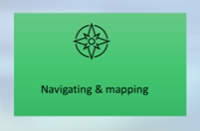 There is an unlimited amount of knowledge on the internet, but which sources can be trusted and provide unique perspectives? And even among the trusted on-line ocean databases that are growing as part of the UN Decade for Ocean Science for Sustainable Development (2021-2030), how to make knowledge accessible and relatable to different users with different learning aims, and most importantly, to potential change-makers?
There is an unlimited amount of knowledge on the internet, but which sources can be trusted and provide unique perspectives? And even among the trusted on-line ocean databases that are growing as part of the UN Decade for Ocean Science for Sustainable Development (2021-2030), how to make knowledge accessible and relatable to different users with different learning aims, and most importantly, to potential change-makers?
For one thing, when searching the internet, Google and other search engines highlight useful and relevant resources but, because of their algorithms, they tend to highlight the loudest voices and the largest organizations. To navigate this overwhelming amount of information and to amplify the furthest stars, the platform provides access to more than 1000 web resources held on other websites, including videos, networks and libraries, projects and programmes, organizations, events, art exhibitions, academic articles, reports and newsletters, all relevant to ocean governance. It relies heavily on the huge amount of research, advocacy and artwork generated by the One Ocean Hub, consistently including the resources generated by the Hub and its many partners across civil society and UN agencies. It creates a diverse knowledge base that allows users to make the most of other knowledge sources.
In addition, One Ocean Learn seeks to foster cooperation and complementarity with the other ocean knowledge-sharing initiatives that UN bodies and international partners are developing, while contributing to making them more accessible to a variety of audiences, connecting them in meaningful learning journeys for change makers.
Learning pathways
 The platform also further curates content by developing short self-learning pathways in which the key audiences of the platform, such as community members, young people, teachers and academics, can get up to speed with a particular skill (such as organizing a virtual conference) or a particular area of ocean knowledge, such as local knowledge or ocean plastics. Other learning pathways introduce transdisciplinarity, illegal, unreported and unregulated fishing, and most recently cultural heritage and ocean governance (Figure 6). One of the key research and transformation intuitions of the One Ocean Hub was better understanding of the inter-dependence between a healthy ocean and human rights, fully appreciating the insights from marine and social sciences, as well as from diverse knowledge systems. Accordingly, many of the learning pathways focus on the ocean and human rights, including children’s rights and ocean governance, and gender and the ocean. Written by experts, each of the learning pathways takes the learner to key resources, highlighting key issues, all in less than three hours. Given that the learning pathways are designed for self-learning, the learner can complete a module of 30-40 minutes in one go, returning to complete the next module at his or her convenience. Each of the learning pathways is completed with a quiz in which the user can test their knowledge. Most of the pathways are also linked to relevant art exhibitions.
The platform also further curates content by developing short self-learning pathways in which the key audiences of the platform, such as community members, young people, teachers and academics, can get up to speed with a particular skill (such as organizing a virtual conference) or a particular area of ocean knowledge, such as local knowledge or ocean plastics. Other learning pathways introduce transdisciplinarity, illegal, unreported and unregulated fishing, and most recently cultural heritage and ocean governance (Figure 6). One of the key research and transformation intuitions of the One Ocean Hub was better understanding of the inter-dependence between a healthy ocean and human rights, fully appreciating the insights from marine and social sciences, as well as from diverse knowledge systems. Accordingly, many of the learning pathways focus on the ocean and human rights, including children’s rights and ocean governance, and gender and the ocean. Written by experts, each of the learning pathways takes the learner to key resources, highlighting key issues, all in less than three hours. Given that the learning pathways are designed for self-learning, the learner can complete a module of 30-40 minutes in one go, returning to complete the next module at his or her convenience. Each of the learning pathways is completed with a quiz in which the user can test their knowledge. Most of the pathways are also linked to relevant art exhibitions.
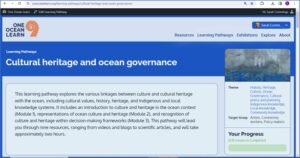
Visualizing the content and the topic map
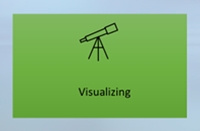 All of the 1000+ web resources on the platform are described in a tailor-made taxonomy which was originally derived from the UNESCO Thesaurus, one of the most comprehensive, multilingual international thesauri. In this thesaurus, the different terms are in a hierarchical relationship with each other. For the platform, we have used the main categories of the UNESCO Thesaurus but added others, also in hierarchical relationships, to better include ocean governance and related themes. We developed the hierarchical taxonomy behind the platform with a view that it would have the potential for visualization in a topic map – although there are other advantages. For example, if you search ‘education’, you will also pull up resources which are indexed using terms which are in the hierarchy of ‘education.’
All of the 1000+ web resources on the platform are described in a tailor-made taxonomy which was originally derived from the UNESCO Thesaurus, one of the most comprehensive, multilingual international thesauri. In this thesaurus, the different terms are in a hierarchical relationship with each other. For the platform, we have used the main categories of the UNESCO Thesaurus but added others, also in hierarchical relationships, to better include ocean governance and related themes. We developed the hierarchical taxonomy behind the platform with a view that it would have the potential for visualization in a topic map – although there are other advantages. For example, if you search ‘education’, you will also pull up resources which are indexed using terms which are in the hierarchy of ‘education.’
Earlier this year, we launched the topic map to explore the knowledge of the ocean (Figure 7) through the network of resources, looking like deep see creatures (Figure 8). This is another highly innovative and visually astounding aspect of the One Ocean Learn portal. This topic map was originally inspired by Mike Powell, Director of Emergent Works. WeAreBoq have put this vision into practice with images reflecting organisms of the deep ocean.
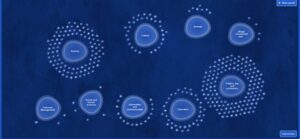
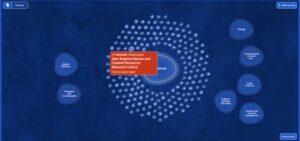
Conclusions
The 2022 United Nations Ocean Conference recognized the need for transformative change to ‘halt and reverse the decline in the health of the ocean’s ecosystems and biodiversity and to protecting and restoring its resilience and ecological integrity’. In response, the Implementation Plan of the UN Decade of Ocean Science for Sustainable Development calls for ‘transformative science’, namely inclusive science that spans the marine and social sciences, is co-designed and co-produced in partnership with a variety of stakeholders and knowledge holders (including Indigenous knowledge holders), and uses Agenda 2030 as a framework for priorities and solutions for governance3. One Ocean Learn contributes to these international processes, by supporting integrative, inclusive and adaptive approaches to ocean knowledge and governance, with a view to supporting the inclusion of underrepresented types of knowledge and empowering those whose interests are currently not being met, representing transformative sustainability values4. One Ocean Learn is thus not only a platform to share knowledge, but rather one that helps different ocean change-makers to connect and navigate with purpose the existing universe of platforms and online sources of ocean knowledge to contribute to transformative change. Please get in touch with the authors if you share this vision and are interested in partnering with One Ocean Learn in its second phase from 2024 onwards.
Authors:
Sarah Cummings PhD
Researcher and consultant on knowledge and sustainable development, The Netherlands
Elisa Morgera PhD
Professor of Global Environmental Law at University of Strathclyde Law School, Scotland
Josefina Ashipala
Training Specialist, UN Institute for Training and Research, Switzerland
Angus Mackay
Director, Division for Planet, UN Institute for Training and Research, Switzerland
Acknowledgements:
The authors would like to acknowledge with thanks the contribution of the UNITAR (Nicola Bruns, Kenneth Atsu Dogbey, Lorenzo Franchi, Sueli Giorgetta, Aphiwe Moshani, Luca Terra) and One Ocean Hub (Senia Febrica, Sarah Lewis, Laura Merilainen, Milica Prokic) teams to development of the platform, as well as the One Ocean Hub’s partners who have provided feedback on different stages of its development. In addition, we acknowledge the important contribution of WeAreBoq (Guilherme Cartaxo, Miquel Duarte) to the vision and its implementation.
Header image:
Kelp forests protect the shoreline during storms, © Julia Granillo Tostado from the exhibition Traditions and tales from the sea.
References:
- Cummings, S., White, N., Schoenmakers, M., van Reijswoud, V., Koopman, M., Zielinski, C., … & Harish, S. (2019). Checklist for the development of portals for international development. Knowledge Management for Development Journal, 14(1), 83-94. ↩
- Brandner, A., & Cummings, S. (Eds) (2018). Agenda Knowledge for Development: strengthening Agenda 2030 and the Sustainable Development Goals. Third Edition. Vienna: Knowledge for Development Partnership. ↩
- Intergovernmental Oceanographic Commission (IOC), UN Educational, Scientific and Cultural Organization (UNESCO) (2021) The United Nations Decade of Ocean Science for sustainable development (2021–2030) implementation plan. ↩
- Erinosho, B., Hamukuaya, H., lajaunie, C., Malinde, A., Lancaster, S., Lennan, M., Mazzega, P., Morgera, E. and Snow, B. (2022) Transformative governance for ocean biodiversity. In: Visseren-Hamakers, I.J. and M. KoK (eds), Transforming Biodiversity Governance. Cambridge: Cambridge University Press. 313-338. ↩

